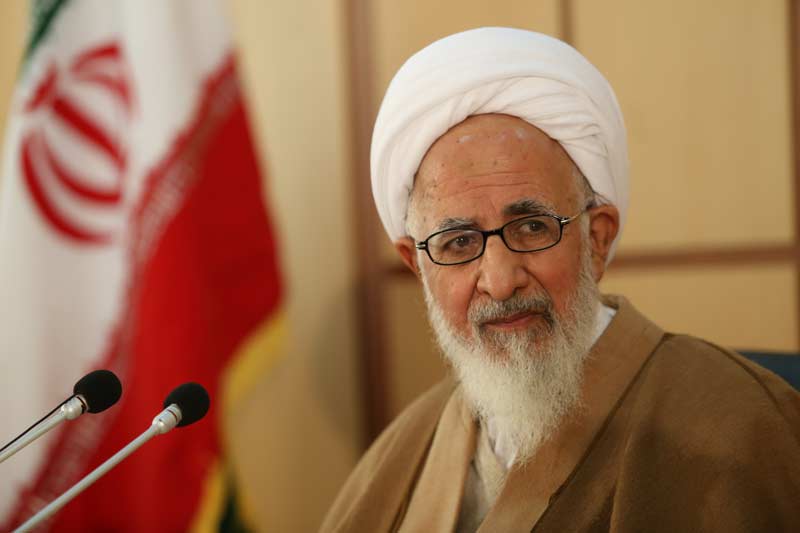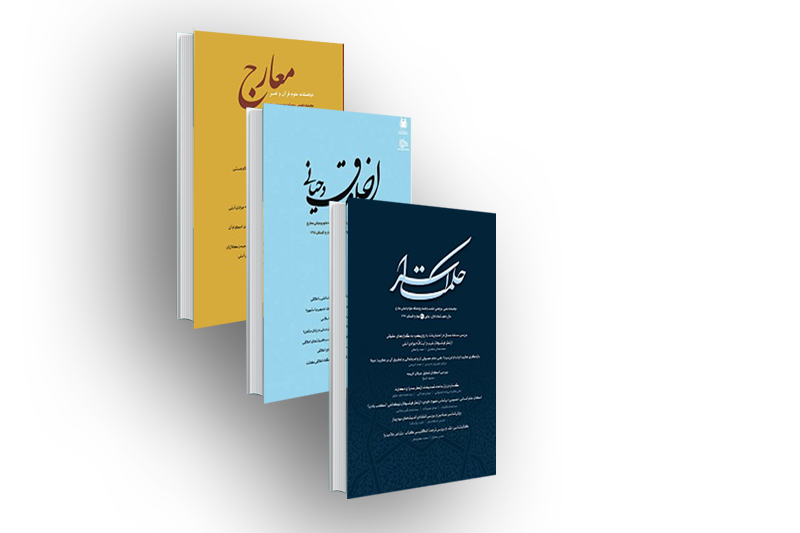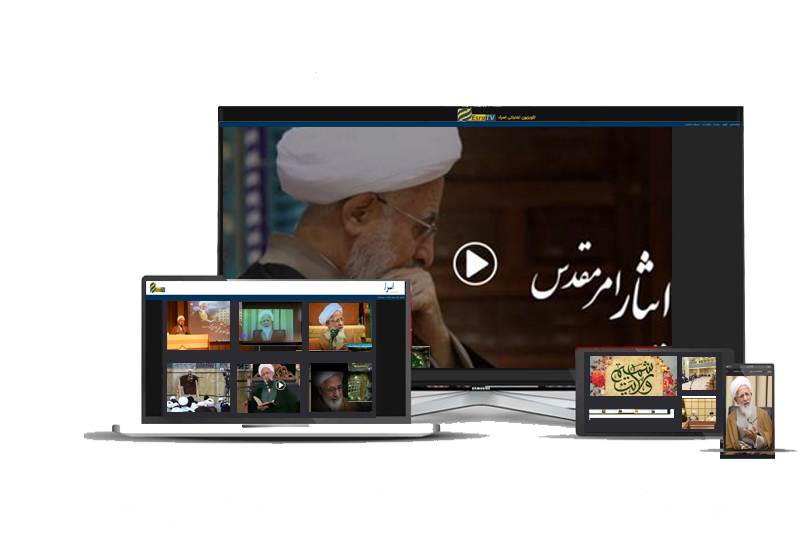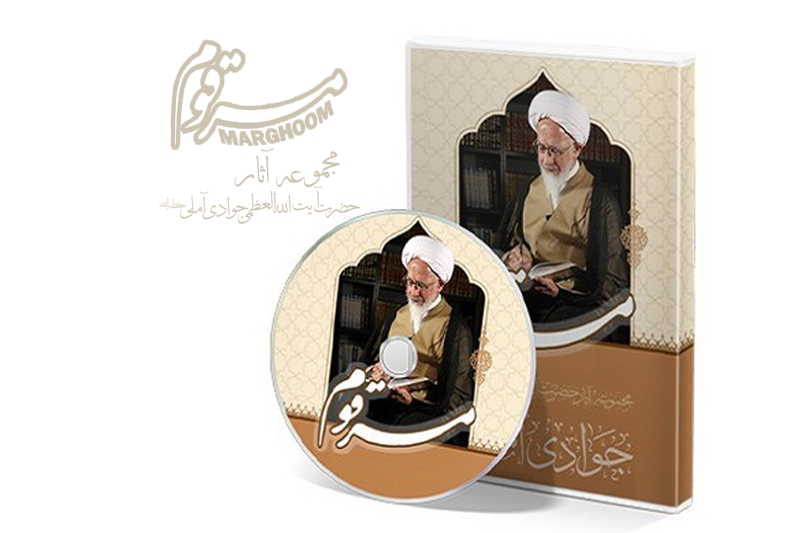His Excellency, Grand ÀyatullÁh JawÁdÐ ÀmulÐ’s
Message to the ÍujjÁj, 1434 H.
In the Name of Allah, the All-beneficent, the All-merciful,
and from Him do we seek help.
Having praised [Allah] and sent salutations and peace [on the Prophet and the Imams], in reverence and prayers; and asked for the acceptance of the Íajj, ÝUmrah, and ZiyÁrah, as well as the answering of the prayers of the ÎujjÁj, muÝtamirÐn, zÁÞirÐn, and supplicants of the two most noble Harams; and sought goodness and felicity for the guests at the table of Revelation and the banquet of inspiration; and wished for the good of this world and the hereafter for all of the people of the qiblah, and all the circumambulators and attendants, [after all of this] it is hoped that the special attention of the Islamic Ummah is focused on some of the points pertaining to the sublime goal of Íajj and ÝUmrah:
First: Unity and multiplicity, individuality and collectivity, are sometimes opposed and contrasted to one another, and sometimes they are complementary; for not all unities are the same, neither are all individuals equal. This is because that unicite being which, by itself is infinite plenitude (kawthar), has all of the effects of multiplicity; and that individual who, regardless of others, has the total effects of the collectivity, is a microcosm of the entire cosmos, and is the Perfect Man who has been manifested as the absolute Intimate (walÐ) of the Lord in the guise of prophethood, messengership, leadership, vicegerency, and ultimately sanctity (walÁyah). Such a being is in his very unity, multiple, and in his individuality, a collectivity. He is given the title, the Comprehensive Being (kawn jÁmÝi), the Night of Power that is better than a thousand months, and in the words of the QurÞÁn and the luminous speech of the People of the House of revelation and inspiration, the Comprehensive Word (jÁmiÝ al-kalim). That is to say, one thing, while being “one”, is multiple—as so many blessings and wisdoms in the context of multiplicity, subsumed under one light. This universal principle is exemplified by the nature of divine wisdom as expounded in the QurÞÁn in the following verse:
ÎA÷sã spyJò6Åsø9$# `tB âä!$t±o 4 `tBur |N÷sã spyJò6Åsø9$# ôs)sù uÎAré& #Zöyz #ZÏW2
He gives wisdom to whomever He wishes, and he who is given wisdom, is certainly given an abundant good! (2:269)
All certain matters and definite principles that are found in the works of the sages, jurisprudents, and scholars of various sciences, is nothing but the elaboration of the concise, and the explanation of the authoritative texts and words of the inheritors of the Comprehensive Word, that is to say, the Family of the Prophet.
Second: The reason behind the founding of the House of Unity, beyond its being the qiblah for those who are near and distant, is it being the place of circumambulation for the locals and the visitors; and the secret of the public proclamation for all and sundry to come to the precincts of the Ancient House “from distant places” (22:27), is to discard their aspect of multiplicity and to take upon the mantle of unity. This is because the distinction of the people of a society from one another due to wealth—by saying, “I have more wealth than you, and am stronger with respect to numbers.” (18:34)—has no basis other than carnal desires and caprice. When such banality dissipates and disperses, then unity, and its first concrete consequence which is the unity of the Islamic Ummah, becomes feasible.
Expelling the dust of multiplicity and the harmonious and coordinated circumambulation around the House of the One and Only, is to take the likeness of the angels who have no opposition and discord amongst themselves—as each one is in his known station with divine contentment…
تَشَبَّهُوا بِمَلائِكَتِهِ الْمُطِيفِينَ بِعَرْشِهِ
they take on the likeness of His angels, the circumambulators of His throne.[1]
Taking on the likeness of the angels of the throne, makes the heart of such a circumambulator to become the throne of the Merciful, so that he may circumambulate around his own heart—which is nothing but the practical intellect of the worshipper of the Merciful and the worker towards Heaven. In this way the reason for God calling the KaÝbah the place of rising against ignorance and misdeeds becomes clear.
@yèy_ ª!$# spt6÷ès3ø9$# |Møt7ø9$# tP#tysø9$# $VJ»uÏ% Ĩ$¨Z=Ïj9
Allah has made the Ka‘bah, the Sacred House, a [means of] arising for mankind. (5:97)
This is because the earth-bound polytheists, and the people of hypocrisy and divisiveness who are their vassals, cannot have any part in standing up against the enemies of the independence of the Muslims and those that usurp the Muslims’ rights. This is naturally so, as fallen and debased man can never rise to the occasion and take flight.
Third: It is the heart of man that is the essential recipient of perfect thought and pure intention of divine inspiration. While it is true that in the terminology of speculative philosophers and the definitions of the people of vision the terms ‘intellect’ and ‘heart’ are very different, nevertheless, the intent here is not either of these meanings—which could actually become great veils that impede the supernal journey; Suffice it to say it is the heart of man that forms the basis of true knowledge and good action. His Eminence, the Seal of the prophets, MuÎammad ibn ÝAbdallÁh (Ò) after having said:
إنّ قلوب بني آدم كلّها بين اصبعين من أصابع الرحمن يصرّفها كيف شاء
Surely the hearts of the sons of Adam are all between the two fingers from amongst the fingers of the Merciful who changes them as He wishes…
said,
اللهم مُصَرّف القلوب صرّف قلوبنا الي طاعتك
O Allah the changer of the hearts, change our hearts towards Your obedience.
When Umm Salmah, the wife of the Prophet (Ò), was asked as to which dua did he do most? She answered:
يا مقلّب القلوب ثبّت قلبي علي دينك
O changer of the hearts, make fast my heart on Your Way.
He continued by telling her, “O Umm Salmah, there is no human being but that his heart is between the two fingers of the fingers of Allah, He causes it to rise if He wants, and He makes it to decline if He wants.” It is necessary to note that all divine wishes and acts of will are in line with [immutable] wisdom, as is seen from his Eminence ÝAlÐ ibn al-Íusayn (Ýa) in the ÑaÎÐfah SajjÁdiyyah where he says,
لَا تُبَدِّلُ حِكْمَتَهُ الْوَسَائِلُ
Means do not change His wisdom.
This means that all of the divine raisings and declinations of human hearts is out of wisdom, and as wisdom always accompanies reason and justice, it is not possible that such changes of the heart are contrary to justice. This also means that whenever a heart deviates, this deviation was necessarily preceded by bad intentions and erroneous decisions [of the human subject], such that the amassment of carnal desires and caprice prepared the grounds for the declination and deviation of the heart.
Fourth: The disease of the body that sometimes ends in death is due to the incompatibility and discrepancy between the various parts of the internal organs. When these organs and parts, small and large, are in harmony with one another, the body is healthy and far from death. The disease of the heart is due to the disharmony and discord between it and other hearts; as it is along with other hearts that all are commanded to build society, and prepare the grounds to populate and cultivate the earth. If the stamp of mercy is impressed upon the Muslim Ummah, the dust of hatred and rancour is wiped off of it. If all, to the extent of their ability, make efforts towards reforming their immediate nation, then God Almighty will grant the grace of unity in multiplicity, as well as the blessing of amalgamation of scattered individuals. This is because the turning of hearts is out of wisdom, but if wrath overcomes mercy, generosity gives way to enmity, and society loses its worthiness of receiving the benefaction of God, the Giving, the Forgiver, then God Almighty leaves that society to itself such that it falls into conjecturing, suspecting, enmity, chaos and quandary. Of course, it is possible that sometimes, due to the blessed station of prophecy of a prophet, imamate of an Imam, and sanctitude of a saint, God will miraculously remove the grievances and spite from human hearts, and bring together those who seemingly opposed one another in irreconcilable enmity so that they become as if they were old friends. This is what took place in the early years of Islamic history:
(#qßJÅÁtGôã$#ur È@ö7pt¿2 «!$# $YèÏJy_ wur (#qè%§xÿs? 4 (#rãä.ø$#ur |MyJ÷èÏR «!$# öNä3øn=tæ øÎ) ÷LäêZä. [ä!#yôãr& y#©9r'sù tû÷üt/ öNä3Î/qè=è% Läêóst7ô¹r'sù ÿ¾ÏmÏFuK÷èÏZÎ/ $ZRºuq÷zÎ) ÷LäêZä.ur 4n?tã $xÿx© ;otøÿãm z`ÏiB Í$¨Z9$# Nä.xs)Rr'sù $pk÷]ÏiB 3 y7Ï9ºxx. ßûÎiüt6ã ª!$# öNä3s9 ¾ÏmÏG»t#uä ÷/ä3ª=yès9 tbrßtGöksE
Hold fast, all together, to Allah’s cord, and do not be divided [into sects]. And remember Allah’s blessing upon you when you were enemies, then He brought your hearts together, so you became brothers with His blessing. And you were on the brink of a pit of Fire, whereat He saved you from it. Thus does Allah clarify His signs for you so that you may be guided. (3:103)
The firm divine cord or rope, due to its relation with the absolute source of power, is immune to all types of wear and tear. The overriding importance of the issue of unity meant that the holding fast and clinging to the rope of unity became obligatory, and disunity and divisiveness became forbidden and proscribed.
That which overcame some of the People of the Book (Jews and Christians) was a type of divine punishment that came in the form of differences, discord, and enmity within their society.
ÆÏBur úïÏ%©!$# (#þqä9$s% $¯RÎ) #t»|ÁtR $tRõyzr& óOßgs)»sWÏB (#qÝ¡oYsù $yàym $£JÏiB (#rãÅe2è ¾ÏmÎ/ $oY÷tøîr'sù ãNßgoY÷t/ nour#yyèø9$# uä!$Òøót7ø9$#ur 4n<Î) ÏQöqt ÏpyJ»uÉ)ø9$# 4 |ôqyur ÞOßgã¤Îm6t^ã ª!$# $yJÎ/ (#qçR$2 cqãèoYóÁt
Also from those who say, ‘We are Christians,’ We took their pledge; but they forgot a part of what they were reminded. So We stirred up enmity and hatred among them until the Day of Resurrection, and soon Allah will inform them concerning what they had been doing. (5:14)
Ignoring the divine covenant and not fulfilling their religious obligations were the grounds for discord and the separation of the members of the community from one another. The Arabic words Ýidy or Ýady mean ‘side.’ In any discord, division, or separation amongst people, they all tend to go to their own particular political, social, cultural, or moral side. Hence this state of disparity and separation is called ÝidÁwah. The mutual hatred that this state causes tarnishes human purity and comes with many other ills.
ÏMs9$s%ur ßqåkuø9$# ßt «!$# î's!qè=øótB 4 ôM¯=äî öNÍkÉ÷r& (#qãYÏèä9ur $oÿÏ3 (#qä9$s% ¢ ö@t/ çn#yt Èb$tGsÛqÝ¡ö6tB ß,ÏÿYã y#øx. âä!$t±o 4 cyÍzs9ur #ZÏVx. Nåk÷]ÏiB !$¨B tAÌRé& y7øs9Î) `ÏB y7Îi/¢ $YZ»uøóèÛ #\øÿä.ur 4 $uZøs)ø9r&ur ãNæhuZ÷t/ nourºyyèø9$# uä!$Òøót7ø9$#ur 4n<Î) ÏQöqt ÏpyJ»uÉ)ø9$#
The Jews say, ‘Allah’s hand is tied up.’ Tied up be their hands, and cursed be they for what they say! Rather, His hands are wide open: He bestows as He wishes. Surely many of them will be increased by what has been sent to you from your Lord in rebellion and unfaith, and We have cast enmity and hatred amongst them until the Day of Resurrection. (5:64)
Disbelief in and rebellion from the command of the Lord had become the source of the dispersion of the Jews and severe discord between themselves. This infliction of enmity and hatred is an instance of the changing of the hearts affected by divine providence. The reason one prays to God that the heart may change towards obedience and become fixated upon divine unity is due to the fact that the master of the hearts is none but God.
Fifth: The noble QurÞÁn recounts the example and method of the prophets and saints so that the Muslim Ummah can take after them and, by so doing, remain safe from extremism. It also gives descriptions of heaven and its inhabitants so that a religious society would be drawn to them and take on those heavenly traits in this world as well.
$oYôãttRur $tB Îû NÏdÍrßß¹ ô`ÏiB @e@Ïî $ºRºuq÷zÎ) 4n?tã 9ãß tû,Î#Î7»s)tGB
We will remove whatever rancour there is in their breasts; [intimate like] brothers, [they will be reclining] on couches, facing one another. (15:47)
w ×qøós9 $pkÏù wur ÒOÏOù's?
there will be neither any vain talk nor sinful speech. (52:23)
The inhabitants of paradise are not spiteful and full of vengeance, rather in perfect brotherhood they face one another on couches. In heaven there is no vanity or sin. The believers while they are in this world try not to be people of vanity and sin, just as the ÎujjÁj and the muÝtamirÐn try their utmost keep safe from vanity, sin, and all forms of errors of thought and action. And while in this world, the people of faith make efforts to not only not go near vanity, but rather, to distance themselves from it wherever they see it.
tûïÏ%©!$#ur öNèd Ç`tã Èqøó¯=9$# cqàÊÌ÷èãB
Those who avoid vanity. (23:3)
úïÏ%©!$#ur w crßygô±o ur9$# #sÎ)ur (#rsD Èqøó¯=9$$Î/ (#rsD $YB#tÅ2
Those who do not give false testimony, and when they come upon vanity, pass by nobly. (25:72)
Such believers pray to God:
$uZ/u öÏÿøî$# $oYs9 $oYÏRºuq÷z\}ur úïÏ%©!$# $tRqà)t7y Ç`»yJM}$$Î/ wur ö@yèøgrB Îû $uZÎ/qè=è% yxÏî tûïÏ%©#Ïj9 (#qãZtB#uä !$oY/u y7¨RÎ) Ô$râäu îLìÏm§
‘Our Lord, forgive us and our brethren who were our forerunners in the faith, and do not put any rancour in our hearts toward the faithful. Our Lord, You are indeed most kind and merciful.’(59:10)
Hence the ambiance of heaven and the example of its inhabitants is what is desired by all those who have faith. Some of the verses quoted were statements of fact that can be understood in the imperative sense, while others were themselves imperative or in the form of a supplication. The secret behind giving accounts of the people of hell and the states therein is to help in abstaining from their ways and save oneself from hellfire—and to emphasize that, God forbid, one should not speak of heaven but think in hellish ways, or want the good and act the bad, because if this were to be the case then the following might come true:
z>ÎÛØsù NæhuZ÷t/ 9qÝ¡Î0 ¼ã&©! 7>$t/ ¼çmãZÏÛ$t/ ÏmÏù èpuH÷q§9$# ¼çnãÎg»sßur `ÏB Ï&Î#t6Ï% Ü>#xyèø9$#
Then there will be set up between them a wall with a gate, with mercy on its interior and punishment toward its exterior. (57:13)
Those who make claims of unity, but actually beat the drums of disunity and division, those who talk of oneness and practice multiplicity, would do good to study the luminous verses and traditions that speak of unity on the one hand, and observe the blessed effects of unity amongst the ÎujjÁj and the muÝtamirÐn on the other hand. Such people should reconsider their intentions and take on the beatitudes of amalgamation and stay away from the evil of discord and division. This is that very Straight Path that is supplicated for during prayers. The Perfect Man is in the very midst of the Straight Path, as per the QurÞÁn, “you are indeed one of the apostles, on a straight path.” (36:3-4) To follow such a man is to embark upon the Straight Path.
Sixth: Íajj and Umrah are like other seasonal and cyclical rites of worship such as fasting in the month of RamaÃÁn, the particular days of iÝtikÁf, and murÁbiÔah. All of these are short-term divine tests that allow the [vast majority of] worshipers to have the ability to carry out all of the other religious obligations in other times and places. As for the elite travellers on the Path, they are always and in all places ready. Imam ÝAlÐ (Ýa) said:
هِي نَفْسِي أَرُوْضُهَا بِالتَّقْوَي لِتَأْتِيَ آمِنَةً يَوْمَ الْخَوْفِ الْأَكْبَر
It is my soul that I train with God-consciousness (taqwa) so that it may bring me safety on the day of the Great Fear. (Nahj al-Balagha, letter 45).
He described one of the students of his way of teaching and training in the following words:
كَانَ لِي فِيَما مَضَي أَخٌ فِي اللَّهِ وَ كَانَ يُعْظِمُهُ فِي عَيْنِي صِغَرُ الدُّنْيَا فِي عَيْنِهِ وَ كَانَ خَارِجاً مِنْ سُلْطَانِ بَطْنِهِ
I had in the past a brother-in-God who was great in my eyes as the world was small in his eyes, and who was free from being ruled by his appetites. (Nahj al-Balagha, wisdom 289)
It is individuals like this who are the paragons of religiosity and God-consciousness. As for the people with mediocre faith, they go through the tests and training periods of the Íajj, Umrah, iÝtikÁf, and fasting in the month of RamaÃÁn to take advantage of the seasonal spiritual harvests that these periods contain so as to stock up for other days. If the golden opportunity of the iÎrÁm period, and the spiritually fertile earth of the Îaram are availed as they should be, then the heavenly benefits of this short period are extremely useful for solving the problems that inevitably come about during the rest of the year and in any other corner of the world; they are also useful in taking the Islamic Awakening of the Middle East to its sublime goal. The point that should be kept in mind in reference to the luminous sentence that was quoted from AmÐr al-MuÞminÐn ÝAlÐ ibn AbÐ ÓÁlib (Ýa) is that it pertains to not only the freedom from the appetite of the stomach, but to all things that can be a thorn along the Path to God. This is because escaping from the bonds of ‘appetite’ is similar in case to the ‘eating up’ of someone else’s wealth that is mentioned in the verse, “Do not eat up your wealth among yourselves unrightfully,” insofar as it is not limited to just ‘eating’ but rather to all appropriations that are not rightful. Hence, in the heavenly perspective of ÝAlÐ the immaculate Imam (Ýa), he who has freed himself from all ephemeral things, become great in the process. The period of the Íajj and the Umrah is the best place and offers a golden opportunity to achieve such a sublime station. It goes without saying that the Imam’s perspective is the same as that of the other Immaculates who were present in the MubÁhilah, as they are the ones who are purified, and were given divine proof, up until the last of the Imams, the promised and extant Mahdi.
Seventh: In the same way that the takbÐrat al-iÎrÁm encapsulates the totality of the precepts and wisdoms of the prayer that it initiates, and the intention of fasting is the implicit agreement to all of the rules of fasting, similarly, the talbiyyah of the Íajj and ÝUmrah is to acknowledge all of the precepts of the Íajj and Umrah. The most important of these precepts is the harmony and coordination of the ÎujjÁj and the muÝtamirÐn during all of the rites of the Íajj. This aspect of concord and coordination in the rules of these two rites can be seen from the beginning stage of the mÐqÁt to the final stage where the hair is shaved or shortened and is concluded by the ÔawÁf al-nisÁÞ. The beauty of the Íajj and the majesty of the Umrah is not only a precursor and reminder of the Resurrection, but also a form of training in religious politics, civics, and statesmanship; as one is to learn that in this world it is imperative to not be an obstacle for others, and to not be misguided oneself (like the people of hypocrisy and division who don’t have the truth themselves and prevent others from getting it, as in the verse, “They dissuade [others] from [following] him, and [themselves] avoid him” (6:26)). This is all the more clear because the ÎujjÁj and the muÝtamirÐn take their rites from the model and exemplar of all travellers on the Path, that is the Holy Prophet (Ò):
ôs)©9 tb%x. öNä3s9 Îû ÉAqßu «!$# îouqóé& ×puZ|¡ym `yJÏj9 tb%x. (#qã_öt ©!$# tPöquø9$#ur tÅzFy$# tx.sur ©!$# #ZÏVx.
In the Apostle of Allah there is certainly for you a good exemplar, for those who look forward to Allah and the Last Day, and remember Allah greatly. (33:21)
The Prophet (Ò) asked for the rites to be taken from himself, just as he himself, like his ancestors prophet Abraham and Ishmael before him, took the rites from God (see QurÞÁn 2:128). The main points of the speeches of the Seal of the prophets (Ò) to ÎujjÁj during the Íajj season constitute some of his best global counsels. The talbiyyah and labbayk of the ÎujjÁj is verbal consent and affirmation of such sublime teachings. It is because of this that it can be said that there is no Makkah without Madinah; just as there is no division between the QurÞÁn and the Family of the Prophet (Ò). Hence, to be blessed with the visitation of Madinah and the meeting of the Imam (Ýa)—whether during his presence or his appearance—and to take advantage of this, is to complete the Íajj and the ÝUmrah. Hence the talbiyyah is really the affirmation of prophethood, walÁyah, imamate, ÝiÒmah, and the authority of the Ahl al-Bayt, as they are, according to the luminous saying of AmÐr al-MuÞminÐn ÝAlÐ ibn AbÐ ÓÁlib (Ýa), the basis of the religion and the mainstay of certainty. The conjunction and close union between the two “weighty things” and prophetic legacies, that is the QurÞÁn and the Ýitrah (the Family of the Prophet), is spoken of in this manner by his Eminence AmÐr al-MuÞminÐn:
أَمَّا وَصِيَّتِي: فَاللَّهَ لَا تُشْرِكُوا بِهِ شَيْئاً وَ مُحَمَّداً صَلَّي اللَّهُ عَلَيْهِ وَ آلِهِ فَلَا تُضَيِّعُوا سُنَّتَهُ أَقِيمُوا هذَيْنِ الْعَمُودَيْنِ وَ أَوْقِدُوا هذَيْنِ الْمِصْبَاحَيْنِ
As to my bequest: With regards to Allah, do not associate anything with Him, and MuÎammad (Ò), do not squander his Sunnah. Uphold these two pillars, and keep alight these two lamps. (Nahj al-Balagha, sermon 149)
It is evident that the Sunnah of the Prophet has been safeguarded by his noble Family and Ýitrah, as “the people of the house know best what is in the house.”
Eighth: The life of this world is not possible without the collectivity and social organization, in contrast to the afterlife, which is in principle individual-based (despite the fact that all individuals will be together on the day of Judgement, as the QurÞÁn says: “Say, ‘Indeed the former and latter generations will all be gathered for the tryst of a known day.” 56:49-50); on that day, neither economic factors, nor social relations will be of any consequence (cf. QurÞÁn 2:254). Every group and school of thought has a criterion and axis by which it ensures its unity and integrity. In Islam this axis is nothing but the unicity of God, His beautiful names, and His sublime attributes, which have manifested themselves in the form of the QurÞÁn along with the Prophet and his Family. No one has the innate right to either ignore or abandon this axis of Reality. The following tradition speaks to the latter theme:
وَ الْزَمُوا السَّوَادَ الْأَعْظَمَ فَإِنَّ يَدَ اللَّهِ مَعَ الْجَمَاعَةِ وَ إِيَّاكُمْ وَ الْفُرْقَةَ فَإِنَّ الشَّاذَّ مِنَ النَّاسِ لِلشَّيْطَانِ كَمَا أَنَّ الشَّاذَّ مِنَ الْغَنَمِ لِلذِّئْبِ أَلَا مَنْ دَعَا إِلَي هذَا الشِّعَارِ فَاقْتُلُوهُ وَ لَوْ كَانَ تَحْتَ عِمَامَتِي هذِهِ
Be with the great throng (of Muslims), for the hand of God is with the Community. Beware of division! For surely the one isolated from the people is (a prey) to Satan, just as the one isolated from the flock of sheep is (a prey) to the wolf. Alas! Whoever calls to this course, kill him, even though he may be under this turban of mine. (Nahj al-Balagha, sermon 127/147)
The same also holds for the individualistic maverick who ignores the community from the start. Many reasons for abandoning and isolating oneself from the Community and Ummah can be found, but the important one is distancing oneself from the central pillar of innate justice and accepted methods in all realms. Extremism of all types, narrow-mindedness, lack of forbearance, egoism, capriciousness, and the like, are all grounds for isolationism and separation from the body of the Community. With the excuse of following the Pious Predecessors and the inability to distinguish true tawÎÐd, certain groups think that all types of intercession, invocation, and supplication of the manifestations and theophanies of God’s grace on the plane of His acts, not His essence and not the attributes of His essence, are invalid. They go on to use the weapon of pronouncing other groups or persons as disbelievers or apostates and excomunicate them from the religious fold, leading to the spilling of the blood of innocents. Whether they know it or not, they have fallen for the ruse of the Zionists and have become the paid or unpaid agents of arrogant powers. It is in this way that the grounds for their intellectual ignorance and practical caprice have been prepared. In contrast, it is evident that the singularity of the qiblah for all, the oneness of the axis of circumambulation, and the sameness of the length of the masÝÁ, and their like, are all aspects of the Íajj and the ÝUmrah that play a crucial role in creating unity and avoiding disunity. The outstanding effect of all these rites is and should be that it brings about a way of life defined by coexistence and far from excommunication and commination.
Ninth: The message implicit in the Íajj and the ÝUmrah, along with all of their rites, addresses and corresponds to three levels or realms of sociology and the social world as far as divine religions are concerned. In the first and innermost realm, that of Islam as the religion of the truth, certain laws must be applied generally and without exception—save certain special situations. In this realm in which the Muslims live, the standing principle should be the content of the verse:
$yJ¯RÎ) tbqãZÏB÷sßJø9$# ×ouq÷zÎ) (#qßsÎ=ô¹r'sù tû÷üt/ ö/ä3÷uqyzr& 4 (#qà)¨?$#ur ©!$# ÷/ä3ª=yès9 tbqçHxqöè?
The faithful are indeed brothers. Therefore make peace between your brothers and be wary of Allah, so that you may receive [His] mercy. (49:10)
By this principle it becomes necessary to observe certain Islamic laws such as have to do with protecting the lives, wealth, and honour of Muslims, allowing them to participate in the Juma, jamÁÝah prayers, Íajj, ÝUmrah, and all other Islamic matters, while allowing for every sect and school of thought from amongst the famous madhÁhib of Islam to follow their own particular rules. In this realm, to avoid chaos and to make sure that scholarly debates do not give way to quarrels and altercations, it is imperative to give full consideration and expect total observation of the following: it is forbidden to insult or disparage the companions of the noble Prophet (Ò); it is forbidden to insult the sanctities of one another; it is necessary to have mutual respect and to respect the traditions and mores of one another.
In the second and middle realm, that of monotheistic world religions that have a revealed book, certain other laws must be applied. In this realm in which the unicity of God and the truth of prophethood is endorsed, the standing principle should be the content of the verse:
ö@è% @÷dr'¯»t É=»tGÅ3ø9$# (#öqs9$yès? 4n<Î) 7pyJÎ=2 ¥ä!#uqy $uZoY÷t/ ö/ä3uZ÷t/ur wr& yç7÷ètR wÎ) ©!$# wur x8Îô³èS ¾ÏmÎ/ $\«øx© wur xÏGt $uZàÒ÷èt/ $³Ò÷èt/ $\/$t/ör& `ÏiB Èbrß «!$#
Say, ‘O People of the Book! Come to a word common between us and you: that we will worship no one but Allah, and that we will not ascribe any partner to Him, and that we will not take each other as lords besides Allah.’ (3:64)
The denunciation and negation in this second realm of the state in which there should be lords and vassals clearly necessitates, by all the more reason, its disallowance in the first realm. The necessity of mutual respect and respect towards the sanctities of one another, as well as the prohibition of insulting the same, are proven matters which will be taken up in the third realm to follow.
In the third and outermost realm, that of humanity, human rights, and world civilization, a third set of laws pertaining to humanity and human rights and without regard to any religion or any sacred or profane school of thought must be applied. In this global realm, the standing principle should be the content of the verse:
w â/ä38yg÷Yt ª!$# Ç`tã tûïÏ%©!$# öNs9 öNä.qè=ÏG»s)ã Îû ÈûïÏd9$# óOs9ur /ä.qã_Ìøä `ÏiB öNä.Ì»tÏ br& óOèdry9s? (#þqäÜÅ¡ø)è?ur öNÍkös9Î) 4 ¨bÎ) ©!$# =Ïtä tûüÏÜÅ¡ø)ßJø9$#
Allah does not forbid you in regard to those who did not make war against you on account of religion and did not expel you from your homes, that you deal with them with kindness and justice. Indeed Allah loves the just. (60:8)
This implies that no individual or group is given preference over any other individual or group; the aggression of an individual or group over another individual or group is reprehensible and rejected. The nation or group that is not the aggressor and not the attacker receives the grace of divine justice and Muslims are responsible and duty-bound to employ justice and fairness in dealing with such nations or groups. That this is a divine matter [and obligation] and not the responsibility of others [i.e. non-Muslims] can be seen when the matter is properly situated vis-à-vis both this world and the afterlife. In taking such an account of the matter, the more important part is that which pertains to the afterlife and the day of Judgement, in which even the smallest things will be measured. Now it is known that every nation has sacrosanct things which it respects, regardless of whether that nation is religious or secular, so clearly it is prohibited to insult and disparage those things, as aside from this being an act of psychological oppression, it will bring about social difficulties on the legal plane. It is for this reason that the noble QurÞÁn says:
wur (#q7Ý¡n@ úïÏ%©!$# tbqããôt `ÏB Èbrß «!$# (#q7Ý¡usù ©!$# #Jrôtã ÎötóÎ/ 5Où=Ïæ 3 y7Ï9ºxx. $¨Yy Èe@ä3Ï9 >p¨Bé& óOßgn=uHxå §NèO 4n<Î) NÍkÍh5u óOßgãèÅ_ó£D Oßgã¥Îm7t^ãsù $yJÎ/ (#qçR%x. tbqè=yJ÷èt
Do not abuse those whom they invoke besides Allah, lest they should abuse Allah out of hostility, without any knowledge. That is how to every people We have made their conduct seem decorous. Then their return will be to their Lord and He will inform them concerning what they used to do. (6:108)
Insulting and disparaging the idols that were worshiped by the polytheists was prohibited by this verse because the polytheists in their ignorance might respond by uttering sacrileges about the God of the believers. That this would be considered to be an ignorant act on their behalf is due to the fact that in their belief structure they actually accepted the existence of God, but saw their worship of the idols to be something that would bring them closer to God through an act of intercession. In any case, by the believers disparaging their gods, they find an excuse, invalid as it may be, to insult God almighty. This is a general and universal rule and it applies to all three of the realms talked about above. Accordingly, no one has the right to insult or disparage the sanctities of anyone else, as the other person might, God forbid, turn around and disparage those things held holy by the believers.
Fighting evil and forbidding wrong must be done in a manner that is good. If the forbidding of wrong is done in the wrong manner, such forbidding must itself be forbidden and, like all other evil acts, it must be rejected. Similarly, calling to truth, goodness, and beauty must be by means that are commensurate and in harmony with those goals. Good ends never justify evil means. Hence, any enjoining of the good that is by means of the bad, must be prohibited. This is because there is a real and actual link between the means and the end; the straight path never lands a person in falsity, just as the deviant path does not lead to the truth.
مَنْ حَاوَلَ أَمْراً بِمَعْصِيَةِ اللَّهِ كَانَ أَفْوَتَ لِمَا يَرْجُو وَ أَسْرَعَ لِمَجِيءِ مَا يَحْذَرُ
He who tries to do something by sinning against Allah, it will diminish his chances of what he hoped for and will expedite the occurrence of what he was wary of.
Abusing and insulting things held sacred by a people, even if those people are misguided, is a method that is evil and forbidden by God. To conclude this point:
- A global and universal religion has a comprehensive and all-inclusive program;
- The most important and expansive religious precept is the observance of international law and etiquette;
- One of the best general and popular etiquettes is to safeguard human nobility and to abstain from disparaging the sanctities of the followers of various sects;
- Insulting the companions, disparaging the sanctities of the Shias or the Sunnis, and unjustly ridiculing the beliefs of these two groups is forbidden (ÎarÁm). Creating discord, igniting the flames of sectarianism, promoting schism, and shattering the foundations of the unity of the Muslim Ummah is a great sin that all, and in particular the ÎujjÁj and the muÝtamirÐn, must avoid at all costs.
- The awareness of the necessity of unity, the prohibition of corruptive discord, and the abstention from insulting the sanctities of all nations and groups, must become one of the souvenirs of this sublime journey of yours, so that ultimately there remains nothing but the fragrance of unity that permeates the length and breadth of the Muslim world. If this does not take place, then aside from an internal diminution of power and glory, the Ummah will be open to attack from the blood-thirsty enemies of the Muslims who will take advantage of Muslim weakness to destroy religious centres and corrode society:
wöqs9ur ßìøùy «!$# }¨$¨Z9$# Nåk|Õ÷èt/ <Ù÷èt7Î/ ôMtBÏdçl°; ßìÏBºuq|¹ ÓìuÎ/ur ÔNºuqn=|¹ur ßÉf»|¡tBur ã2õã $pkÏù ãNó$# «!$# #ZÏV2
Had not Allah repulsed the people from one another, ruin would have befallen the monasteries, churches, synagogues and mosques in which Allah’s Name is mentioned greatly. (22:40)
Tenth: The rites of the Íajj and ÝUmrah, like all other acts of worship, are sometimes done out of a fear of hellfire, sometimes out of a desire for heaven, and in certain cases out of a sincere love of God and as a token of thankfulness for His blessings and for the glory of His remembrance and His name. Each one of these three modalities of worship corresponds to a name from amongst the beautiful names of God. The meaning of ‘sincerity’ in the latter modality is not just to refrain from ostentation—which is one of the most primary conditions of all worship—but rather, the meaning in this context is to refrain from seeking anything other than the remembrance of God and the beatific vision.
The good news and glad tidings found in the QurÞÁn are various and correspond to the level and station of worship of the believers. Some are promised a material or bodily paradise—this is the common lot of all of the people of heaven and none are deprived of this level. Others go beyond this formal paradise and find a presence in the heaven of Mercy.
¨bÎ) tûüÉ)FçRùQ$# Îû ;M»¨Zy_ 9pktXur Îû Ïyèø)tB A-ôϹ yYÏã 77Î=tB ¤ÏtGø)B
Indeed the Godwary will be amid gardens and streams, in the abode of truthfulness with an omnipotent King. (54:54-55)
Then there are those who go beyond the paradise of material pleasures and the heaven of Mercy to enter into the Pleasure of God, which is such a sublime station that it is described in the following way:
öNèdçÅe³t6ã Oßg/u 7pyJômtÎ/ çm÷YÏiB 5bºuqôÊÍur ;M»¨Zy_ur öNçl°; $pkÏù ÒOÏètR íOÉ)B
Their Lord gives them the good news of His mercy and [His] pleasure, and for them there will be gardens with lasting bliss. (9:21)
The guests of the Merciful, according to their understanding and sincerity of intention in performing their rites, are the recipients of glad tidings and rewards from God. Considering the fact that the promised rewards correspond to the importance of that for which they are awarded, the relative importance of the different stages and rites of the Íajj and the ÝUmrah can be discovered by looking at the rewards promised. This is similar to the rewards and glad tidings given in the revelation for God’s saints or people. For instance, HaÃrat Maryam is given the glad tiding of the birth of Christ:
øÎ) ÏMs9$s% èps3Í´¯»n=yJø9$# ãNtöyJ»t ¨bÎ) ©!$# Ï8çÅe³u;ã 7pyJÎ=s3Î/ çm÷ZÏiB çmßJó$# ßxÅ¡yJø9$# Ó|¤Ïã ßûøó$# zNtötB $YgÅ_ur Îû $u÷R9$# ÍotÅzFy$#ur z`ÏBur tûüÎ/§s)ßJø9$#
When the angels said, ‘O Mary, Allah gives you the good news of a Word from Him whose name is Messiah, Jesus, son of Mary, distinguished in the world and the Hereafter, and one of those brought near [to Allah]. (3:45)
Or at other times the glad tiding given is that of the seal of the prophets, MuÎammad (Ò):
#MÅe³t6ãBur 5AqßtÎ/ ÎAù't .`ÏB Ï÷èt/ ÿ¼çmèÿô$# ßuH÷qr& (
and to give the good news of an apostle who will come after me, whose name is Ahmad.’ (61:6)
In the same vein, the highest of the glad tidings and good news is the beatific vision of the beautiful names of God that becomes the lot of ÎujjÁj who are sincere, muÝtamirÐn who are free of both cowardice and avarice, ÝÁkifÐn who are devoid of both affection and wrath, and ÔÁÞifÐn who are unattached to both fear and hope from anything other than God.
O ÎujjÁj and muÝtamirÐn! Walk with a sense of the sacred in the land of revelation, and intone nothing but the remembrance of God. In this holiest of lands, prophets from Adam to MuÎammad (Ò), and saints from the Seal of the prophets to the Seal of sanctity and imamate, the promised and extant MahdÐ (Ýa) were and are present. They walked and are walking in this holy place. You, at this very moment, are walking in their steps, and are repeating your labbayk in the same place which echoed with their talbiyyah.
Pray for the imminent advent of the remnant of all the prophets and all the saints, who with his cry,
أنا بقية الله
I am the remnant of Allah!
will rise to raise the Ummah and flatten the arrogant oppressors of the world, so that those who accept austere conditions in this world, harken to his call, and betoken the plane of Resurrection, are the ones who: free the oppressed nations from the clutches of the oppressors; revive the pure teachings of the QurÞÁn and the Sunnah given by the Immaculates; disclose the unknown graves of the divine saints and proofs, especially ÍaÃrat FÁÔimah ZahrÁÞ.
A Íajj out of love and ecstasy is a clear example of the luminous tradition:
أفضل الناس مَن عَشِقَ العبادة فعانقها و أحبّها بقلبه و باشرها بجسده
The best of men is he who yearns for worship, embraces it, makes it beloved to his heart, and feels it with his body.
O Lord! Protect the Islamic order from all afflictions until the advent of its true master! By the grace of the Seal of the Imams (Ýa), safeguard the Islamic Awakening and Muslim unity of the Middle East from all harm! Hasten the advent of ÍaÃrat MahdÐ, the promised, the extant! Accept the acts of worship and the supplications of the ÎujjÁj, muÝtamirÐn, ÝÁkifÐn, and ÔÁÞifÐn, and grant them a safe passage back to their homes! Protect the KaÝbah from any and all horrible mishaps, as according to a tradition from Imam ÑÁdiq (Ýa): “Religion will withstand so long as the KaÝbah stands”! Peace be upon you and the mercy of Allah and His blessings!
JawÁdÐ ÀmulÐ
DhÙ al-QaÝdah 1434
[1] Nahj al-Balagha, sermon 1.











 Esra Publishing Center, the exclusive publisher of Ayatollah Javadi Amoli's works, started working in 1993; Among the missions and duties of the center are the production of written works with the desired and standard quality, fast and timely supply at the right price and supporting the products, providing easy, fast and low-cost access to the products for the domestic and foreign audiences, attending domestic and foreign international exhibitions, ….
Esra Publishing Center, the exclusive publisher of Ayatollah Javadi Amoli's works, started working in 1993; Among the missions and duties of the center are the production of written works with the desired and standard quality, fast and timely supply at the right price and supporting the products, providing easy, fast and low-cost access to the products for the domestic and foreign audiences, attending domestic and foreign international exhibitions, ….
